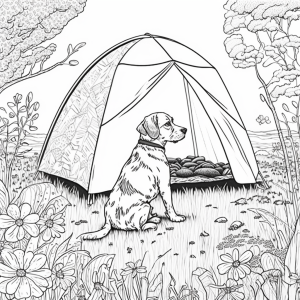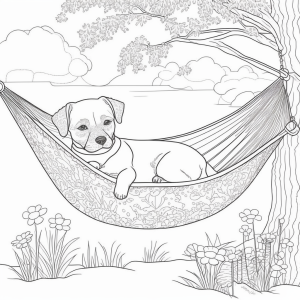Tips For Camping With Your Dog
 When you and your dog are camping together, you’ll find that your bond will grow stronger. This is because your dog will be getting the same kinds of physical and mental stimulation that you do, and they’ll be interacting with other people and dogs like they never have before.
When you and your dog are camping together, you’ll find that your bond will grow stronger. This is because your dog will be getting the same kinds of physical and mental stimulation that you do, and they’ll be interacting with other people and dogs like they never have before.
But, before you head out on a trip with your dog, there are some things you need to know that can help make the experience as smooth as possible. These tips will ensure that your dog stays safe and comfortable during the trip and your dog enjoys the trip as much as you do and keeps you safe too!
-
-
- First, plan your trip well ahead of time. This is because you’ll want to take your time with your dog and get them used to the tent, campfire, and other elements of your camping trip. That way, you won’t be left with a panicked dog that doesn’t know what to do once they arrive at the campsite.
- Choose a dog-friendly campsite: Make sure to choose a campsite that is dog-friendly and allows dogs on the trails and other areas of the campground.

- Prepare your dog for the trip: Before you go camping, make sure your dog is up-to-date on all their vaccinations, and bring any necessary medications. It’s also a good idea to give your dog a flea and tick preventative treatment before the trip.
- If your dog has never been in a tent before, you should do a practice run with them at home or in a nearby campsite to see how they react. Doing this will ensure you don’t have to worry about them destroying your tent, or making them uncomfortable by the fabric’s smell or sound when they’re inside it for the first time.
This article contains affiliate links
- pack all the right essentials for camping with a dog. This means a collar and leash, food bowls, water, poop bags, and of course, your dog’s favorite toys! Bring along plenty of food, water, and treats for your dog. Also, don’t forget to pack any other items your dog may need, such as a dog bed or crate. Bring toys: Bring toys or chews for your dog to keep them occupied during downtime.
-
- you’ll want to have a first aid kit on hand so that your dog can be treated if they get injured during their camping trip. This can include a towel, a small bottle of hydrogen peroxide, antibiotic ointment or spray, gauze, a splint or soft muzzle, booties, and Benadryl (make sure you know the safe dosage). This can all be purchased at pet specialty stores or you could even make your own doggy first aid kit if you have some time to spare.
- It’s also a good idea to make copies of your dog’s medical records to bring along on the trip in case you get separated from your dog and need to call the vet for help.
- The last thing you’ll want to happen is to have to scurry back to your vehicle only to find out that your dog is sick, or worse, lost. That’s why you should always have your pet microchipped before you go on a camping trip so that if they do end up lost, you’ll be able to find them and get them to the vet as quickly as possible!
- Your dog should be familiar with their leash and their command word before you leave on your trip. This will help you keep them on their leash and prevent them from getting out of control or getting into trouble.
- check out and be familiar with the area you’re staying in and be aware of the rules that are in place at your campsite. Some campgrounds prohibit dogs while others have specific restrictions that can make the experience more difficult.
- Watch for hazards: Keep an eye out for potential hazards such as sharp rocks, steep cliffs, or poisonous plants that could harm your dog.
- Be considerate of others: Remember that not everyone loves dogs, so keep your dog under control and be considerate of other campers.
- Clean up after your dog: Always pick up after your dog and dispose of waste properly.
- Monitor your dog’s behavior: Watch your dog’s behavior and make sure they are comfortable and not showing any signs of distress or discomfort.
- Keep your dog comfortable with their temperature: Make sure your dog has access to shade and plenty of water to stay cool in hot weather and a warm place or warm clothing when it’s cold. Check the weather: Be prepared for changes in weather conditions by bringing appropriate gear for your dog, such as a raincoat or a warm jacket.

- Plan activities that include your dog: Consider going on hikes, playing fetch, or swimming with your dog to keep them entertained and active.
- Train your dog: Before you go camping, make sure your dog is trained in basic obedience commands such as “come,” “stay,” and “leave it” to keep them safe and under control.
- Secure your dog at night: Make sure your dog is secured and comfortable during the night, either in a crate or on a dog bed in the tent.
- Identify your dog: Make sure your dog is wearing a collar with identification tags, including your name, phone number, and any medical information.
- Be mindful of wildlife: Keep your dog on a leash to prevent them from chasing wildlife and potentially getting hurt.
- Avoid leaving your dog unattended: Don’t leave your dog unattended at the campsite, as they may become anxious or escape.
- Check for ticks: Check your dog for ticks regularly, especially after walks or hikes in wooded areas.
- Respect other campers: Make sure your dog isn’t barking excessively or disturbing other campers.
Dogs in a Bear Area
Taking a dog into an area with bears can be risky, and it’s important to take precautions to keep both your dog and yourself safe. Some dogs may be more prone to chasing or approaching bears, which can lead to dangerous situations.
If you plan to camp in bear country with your dog, here are some things to consider:
- Research the area: Research the area you plan to visit to determine if bears are present and what type of bears they are (grizzly or black bears).
- Keep your dog on a leash: Keep your dog on a leash at all times, even when inside the tent, to prevent them from wandering and potentially encountering a bear.
- Use bear-resistant containers: Store your food, trash, and other scented items in bear-resistant containers to keep bears from being attracted to your campsite.
- Be aware of your surroundings: Keep a close eye on your surroundings and watch for signs of bear activity such as tracks or scat. Be especially cautious during dawn and dusk when bears are most active.
- Make noise: Make noise as you hike or move around the campsite to alert bears of your presence. This can help prevent surprise encounters.
- Carry bear spray: Carry bear spray with you and know how to use it in case of an encounter.
- Consider leaving your dog at home: If you’re unsure about your dog’s behavior around bears or feel uncomfortable taking them into bear country, consider leaving them at home or finding a dog sitter.
Ultimately, it’s up to you to determine whether it’s safe to take your dog into an area with bears. If you do decide to take your dog, it’s important to take all necessary precautions to ensure everyone’s safety.
Campers Who Don’t Like Dogs
If you don’t like dogs, it’s important to communicate your preferences to other campers and avoid camping near areas where dogs are allowed. You can check with the campground or park management to see if there are any designated dog-free areas
where you can camp.
If you encounter a dog while camping and feel uncomfortable, it’s best to avoid approaching or interacting with the dog. If the dog is off-leash and the owner is not nearby, you can try to calmly and gently shoo the dog away from your campsite or hiking trail.
Remember, it’s important to respect other campers and their pets while camping. If you’re camping in a designated dog-friendly area, you may encounter dogs, and it’s important to be courteous and mindful of others.
If you encounter a dog while camping and feel uncomfortable or want the dog to go away, there are some things you can do:
- Remain calm and still: Dogs can sense fear and agitation, so it’s important to remain calm and still.
- Avoid direct eye contact: Direct eye contact can be seen as a sign of aggression by dogs, so it’s best to avoid staring directly at the dog.
- Speak calmly and firmly: Use a calm, firm voice to communicate with the dog. You can say “go away” or “no” in a clear, assertive tone.
- Use a deterrent: You can carry a dog deterrent spray or noise-making device to discourage the dog from approaching you.
- Back away slowly: If the dog continues to approach you and you feel unsafe, slowly back away while maintaining eye contact with the dog.
Remember, dogs can be unpredictable, and it’s important to stay calm and avoid aggressive behavior towards them. If the dog is aggressive or appears to be a stray, it’s best to seek help from park rangers or animal control.
Dogs In Hammocks
If you sleep in a hammock when camping, it’s still possible to take your dog with you on your next camping trip. Here are some tips to keep in mind when hammock camping with a dog:
- Train your dog to sleep in a hammock: It’s important to train your dog to sleep in a hammock before going camping. You can practice at home by setting up the hammock and encouraging your dog to climb in and out of it.
- Use a hammock with a bug net: If you’re camping in an area with mosquitoes or other bugs, it’s a good idea to use a hammock with a bug net to protect your dog from insect bites.
- Bring a dog blanket: Bring a blanket or pad for your dog to lie on inside the hammock. This will keep them comfortable and protect the hammock from scratches and tears.

- Use a harness: Use a harness to secure your dog in the hammock to prevent them from falling out during the night.
- Keep your dog warm: Depending on the temperature, you may need to bring extra blankets or a sleeping bag to keep your dog warm during the night.
- Bring a water bowl: Bring a collapsible water bowl for your dog to drink from during the night.
- Consider the weight limit: Make sure the hammock is rated to support your dog’s weight before bringing them along.
- Remember to follow all campsite rules and regulations when bringing your dog camping. Always keep your dog on a leash and pick up after them to minimize impact on the environment.
Camping With an Anxious Dog
Taking an anxious dog on a camping trip can be challenging, but with some preparation and planning, it can be a positive experience for both you and your dog. Here are some tips to consider:
- Plan ahead: Research the campsite and surrounding area to ensure that it’s a suitable environment for your dog. Check if the campsite has a dog-friendly policy and if there are any specific rules or regulations that you need to follow.
- Gradually introduce your dog to camping gear: Introduce your dog to camping gear such as a tent, sleeping bag, and camp stove gradually before the camping trip. This will help your dog become familiar with the equipment and reduce anxiety.
- Bring familiar items: Bring familiar items from home such as your dog’s bed, toys, and favorite treats. This will provide a sense of familiarity and comfort for your dog.
- Use a crate or playpen: Bring a crate or playpen for your dog to use as a safe space. This will provide a designated area for your dog to retreat to if they feel overwhelmed or anxious.
- Stick to a routine: Stick to your dog’s regular routine as much as possible during the camping trip. This includes meal times, exercise, and potty breaks. A consistent routine will help your dog feel more comfortable and relaxed.
- Provide plenty of exercise: Make sure your dog gets plenty of exercise during the day to tire them out and reduce anxiety. This could include hiking, swimming, or playing fetch.
- Consider medication or calming aids: If your dog has severe anxiety, speak with your veterinarian about medication or calming aids that may help your dog relax.
- Remember to keep an eye on your dog and observe their behavior. If they seem uncomfortable or anxious, take a break or adjust your plans as needed to ensure your dog’s well-being.
Camping with a pet dog can be a fun and rewarding experience, especially if you follow the tips above.